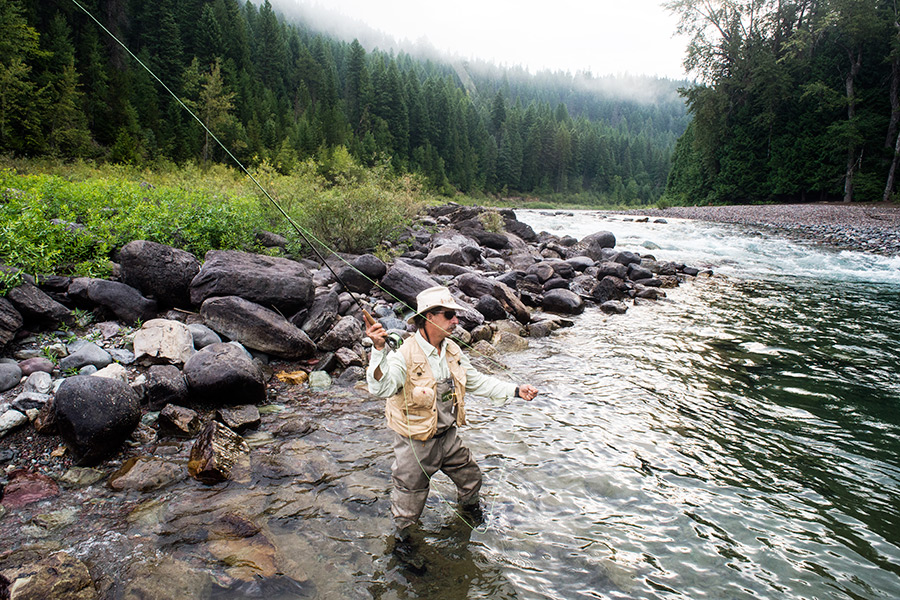Montana’s hunters and anglers have as much vested in the Paris climate negotiations as the state’s abundant suite of wildlife, according to research compiled by the National Wildlife Federation, which recently released a report detailing what’s at stake culturally, ecologically and economically if a solution is not forthcoming.
As 150 world leaders at the 2015 United Nations Climate Change Conference hash out a binding agreement for curbing greenhouse gas emissions, scientists studying moose, cutthroat trout, mountain goats, and other wild animals in Montana are sounding the alarm about climate impacts in the Treasure State.
The National Wildlife Federation’s report is entitled “Game Changers: Climate Impacts to America’s Hunting, Fishing and Wildlife Heritage,” and outlines the historic role of hunters and anglers in conservation and the many ways in which the changing climate is affecting hunting and fishing opportunities and the state’s robust outdoor economy.
The report touches on a range of species that require cold-water and high-elevation habitats for survival, but for which a warming world is threatening – from moose and mountain goats to cutthroat trout, whitetail dear and snowshoe hares.
The report comes on the heels of the U.S. Environmental Protection Agency’s release of the Clean Power Plan, a new strategy to reduce carbon pollution from the nation’s power plants, and in the midst of international talks about climate change, which are taking place in Paris Nov. 30-Dec. 11.
Dave Ditloff, a spokesman for NWF, said the iconic fish and wildlife species of Montana are culturally and economically critical to the state.
Citing a study that concludes Montana’s economy has more than $1 billion riding on hunting, fishing and wildlife watching, Daniel Iverson, communications manager for Montana’s Office of Tourism and Business Development, said more than 80 percent of Montana’s visitors in 2014 reported they came for outdoor activities, whether hunting, skiing, visiting a state or national park, or wildlife watching.
He added that last year outdoor enthusiasts spent more than $240 million on outfitters and guides.
Ditloff said climate change could adversely affect that outdoor economy.
Historian and outdoor ethicist Jim Posewitz said hunters and anglers were some of America’s first supporters of conservation and wildlife management, and still play a key role in conservation and economic support. Through various excise taxes and the purchase of hunting and fishing licenses and stamps, sportsmen and women provide critical funding to state fish and wildlife agencies for conservation. They also contribute some $90 billion to the national economy each year.
“Unfortunately, the pastimes of hunting and angling and the enjoyment they provide are being threatened by climate change. Many of the cherished species important to these sportsmen and women, including big and small game, birds, and fish, are facing increasingly dangerous situations brought on by warmer waters, shorter winters, and longer droughts,” the report states.
Mountain goats, an iconic species synonymous with a visit to Glacier National Park, dwell in high, rugged areas, a trait the NWF report says makes them more vulnerable to warming temperatures. The report says high altitudes are warming faster than lower altitudes.
Bruce Smith, a biologist who has written about mountain goats, said unlike other species, goats are beholden to rare habitat requirements, and can’t just move on when their high-elevation homes are no longer suitable.
“They already live on islands in the sky,” he said, adding that they can’t climb any higher.
Posewitz said he was encouraged by the ongoing talks in Paris, and that he hoped the talks would spur action among outdoor enthusiasts, similar to the Theodore Roosevelt-era of conservation, a movement that gained prominence under the former president during the late 19th and early 20th.
Efforts by Roosevelt and others changed the relationship people had with nature and helped preserve wildlife, and its success created “a model of restoration that worked.”
He hopes that the talks on climate change can look to that time as a model and find a way to deal with the rising temperatures.
Read the full report at www.nwf.org.
